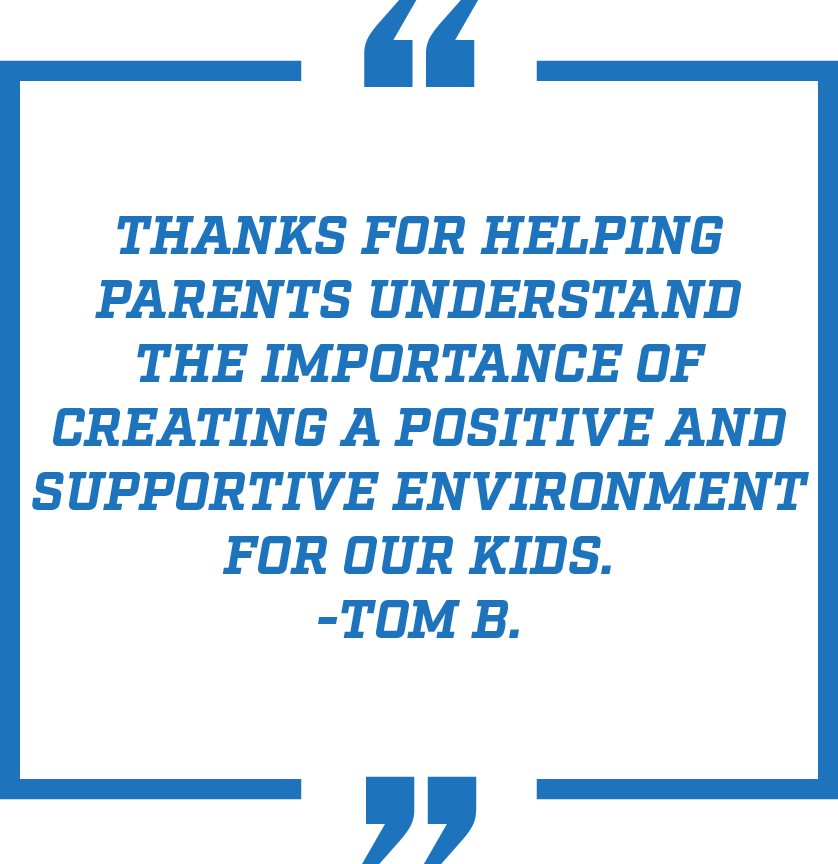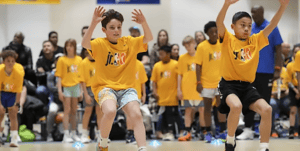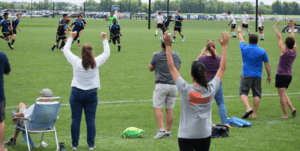
WHY TAKE BACK SPORTS?
62% OF CHILDREN AGED 6–12 DO NOT PLAY SPORTS regularly*
11 AVERAGE AGE AT WHICH CHILDREN QUIT SPORTS*
69% OF SPORTS REFEREES BELIEVE SPORTSMANSHIP IS GETTING WORSE*
WHAT CAN WE DO?
*Data from Aspen Institute's Project Play & the National Association of Sports Officials

MEET OUR ‘TAKE BACK SPORTS’ AMBASSADORS
TAKE THE
"AM I THAT SPORTS PARENT?"
ASSESSMENT

TAKE THE
"AM I THAT SPORTS PARENT?"
QUICK QUIZ
You think you’re not that sports parent.
But what if you are?
Find out in 60 seconds or less. Your kid will thank you.
- Have you ever criticized an official at a youth sports game?
- Have you ever told your player what to do from the sidelines while they are playing?
- Have you ever said “what were you doing out there?” to your player?
- After a game, have you ever been critical of other players’ performances on the team?
- After the game have you ever been critical of your player’s coach?
- Have you ever said “You need to take this more seriously” to your player?
OKAY, SO NOW WHAT?
C. Spread the word and choose ways to help activate positive youth sports experiences for your athlete and community
TAKE BACK SPORTS VIDEOS
Trending Resources

What Parents Say...



PARENT WORKSHOPS & ONLINE COURSES

PARENT WORKSHOPS
ONLINE COURSES
Receive FREE access to PCA's Positive Sports Parent Course by using code: PCAESPN at checkout.
Ask A PCA Expert
SEE WHAT SPORTS PARENTS HAVE BEEN ASKING
1.
How can I support my child from the sidelines?
1. How can I support my child from the sidelines?
It’s disconcerting for athletes to have parents yell out instructions. Athletes may struggle to decipher what to do when they get instructions from the stands and from their coaches – especially if they are conflicting. Being mindful of what you are yelling to your athlete can help them better focus on the game and the strategy that the coach employs. Different families bring different energy to the game. But if we want youth sports to build confidence and joy, here are some ways we might reflect on our sideline habits.
Commit to no-directions cheering to help your athlete succeed. Eliminate verbs in your cheering because you can’t give advice without verbs. For example, “Pass the ball to Sarah” is a no-no because it uses the word “pass” as a verb to give directions. On the other hand, “Great pass, Sarah!” gives no directions. You’re just commenting (appreciatively) on what you see Sarah doing.
Families express support in different ways. Consider asking your child what kind of cheering helps them most during games, so you can align your support with their experience.
2.
How do I help my child who is lacking playing time on the team?
2. How do I help my child who is lacking playing time on the team?
Watching our athletes put in endless effort and not be rewarded with playing time can be incredibly frustrating for a sports parent. It can be equally or more frustrating, and even discouraging for the athletes themselves.
A positive sports parent sees this as an opportunity to help their athlete develop resilience and voice while dealing with adversity.
Tips to Support Your Athlete:
- Provide unconditional support. Celebrate your athlete’s successes and improvements regardless of playing time awarded.
- Check-in with your athlete regularly to understand their perspective. Listen to understand, confirm what you hear, and validate their experiences. Be an ally in these conversations to ensure that, when concerns arise, athletes’ feel heard – especially in environments where biases may exist.
- Collaborate with your athlete to set attainable goals that highlight their effort – i.e. In practice today, whenever the other team has the ball, hustle back on defense as hard as you can.
- If language, immigration status, or past experiences with institutions make advocacy feel unsafe—consider partnering with a bilingual parent, team manager, or trusted adult to help open respectful dialogue.
- Encourage your athlete to focus on what they can control – giving their best effort, looking for opportunities to learn and improve, and supporting teammates.
- Support your athlete’s self-advocacy. Giving athletes the opportunity to self-advocate for playing time will help them develop important life skills while fostering important interactions with their coach.
- Provide the athlete what they may need to engage in this conversation, like:
- Role play the conversation with them beforehand
- Help them develop a list of talking points they want to be sure to hit
- Collaborate on what potential solutions could be
- Prepare them to receive critical feedback
- Provide the athlete what they may need to engage in this conversation, like:
- Avoid making negative comments about the coach or coach’s decisions in front of your athlete to help maintain their trust in the coach. Acknowledge and address concerns about fairness and equity if they arise while maintaining a respectful dialogue about the coach’s decisions. Encourage open conversations that focus on solutions rather than blame.
As a sports parent you can support your athlete in developing many life skills which can increase their playing time opportunities. Ultimately, a sports parent/caregivers role is to support their athlete in having the best possible sports experience
3.
How do I provide support if I can't attend games regularly?
3. How do I provide support if I can't attend games regularly?
A positive sports parent can contribute to the team community by fostering a sense of belonging amongst their peers. When all parents feel engaged in the team, they’ll be able to best support their athlete in gaining the benefits of a positive sports experience. Unfortunately, not all parents/caregivers are able to attend games due to outside circumstances – such as availability, work, distance, lack of child care, or other commitments. Some families may need language support to stay informed. If your team includes multilingual families, consider translating key communications or assigning a bilingual liaison to help bridge the gap. The strategies below will help positive sports parents support their peers and, ultimately, help create a positive experience for all athletes involved on the team.
Sports Parents Can:
- Implement Parent partnerships
- Pair up parents into partnerships that aim to provide each other any support they may need. For instance, if one pair of the partnership is unable to attend a game, the other can:
- Provide updates on the game and how their athlete is doing.
- Actively cheer and encourage the athlete whose parent/caregiver couldn’t attend.
- Send pictures/videos of plays by their athlete
- Pair up parents into partnerships that aim to provide each other any support they may need. For instance, if one pair of the partnership is unable to attend a game, the other can:
- Advocate for and actively use a communication platform
- Connect with other parents and determine an accessible, effective method to communicate amongst the team community. Actively use this communication platform to coordinate transportation, provide game updates, and keep all parents/caregivers connected to the team.
- Apps like TeamSnap can be used to provide roster information, game and practice schedules, custom parent chat groups, and score and stat updates.
- If some caregivers on your team have limited access to tech or data plans, consider offering updates via phone calls, printed info sheets, or group texts that don’t require app downloads.
All parents can approach parents who are unable to attend games with empathy and understanding.





